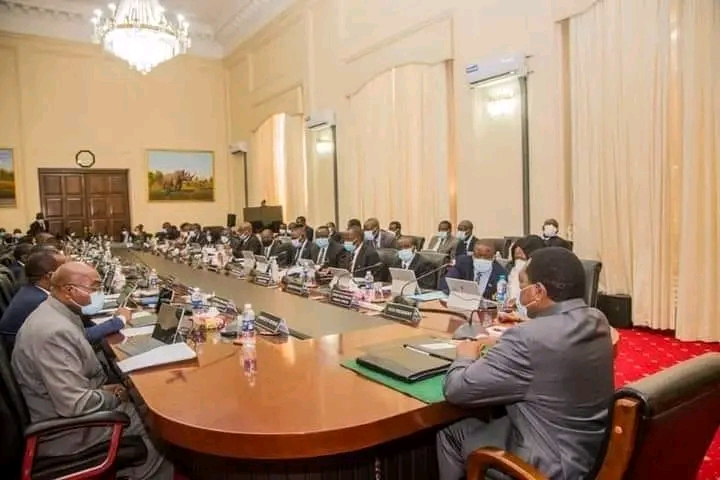Zambia’s 21st Cabinet Meeting which was held on Monday, 26th September, 2022 chaired by President Hakainde Hichilema
Notice: Undefined index: catFilterList in /home/zambi/public_html/wp-content/plugins/wp-likes/api.php on line 243

21st Cabinet Meeting Zambia Monday, 26th September, 2022
Fellow citizens, good evening.
The President of the Republic of Zambia, Mr. Hakainde Hichilema called for the 21st Cabinet Meeting which was held on Monday, 26th September, 2022, at State House, to deliberate on policy and legislative matters in order to ensure delivery of services to the people in line with the transformation Agenda for Government going forward.
The following were the decisions made:
1. Capital Markets Master Plan.
Cabinet approved the Capital Markets Master Plan, and its associated Implementation Plan with a view to repositioning the Zambian Capital Markets to become an attractive international destination for long-term investment and be the primary choice for accessing long term investment capital for Zambia, that will contribute to sustainable growth, development, and stability of the country.
The decision by Cabinet comes with the recognition of the potential Capital markets have to make a significant contribution to Zambia’s economic development. The Capital Markets Master Plan, therefore, aims to create an attractive environment for investors, borrowers and market intermediaries to spur the development of Zambia. Deep, liquid, and well-regulated capital markets are instrumental in financing the economy and are the foundation for a thriving private sector, a key driver of job creation and economic growth, in line with the recently approved 8th National Development Plan and the aspirations of attaining the Vision 2030 of becoming a Prosperous Middle-Income Country by 2030.
2. Legislation Matters:
During the Meeting, Cabinet also deliberated on the following six (6) legislation issues:
(a) The Plant Variety and Seeds Act (Repeal and Replacement) Bill, 2022.
Cabinet approved in principle, to the introduction of a Bill in Parliament to repeal and replace the Plant Variety and Seeds Act, Cap 236 of the Laws of Zambia.
The current legislation is inadequate in dealing with many issues related to the seed sector that has undergone changes over the past years from being government driven and dominated, to a liberalised market, hence the need to repeal the legislation in order to bring it in line with international best practices and provide for enhanced private sector participation in the seed industry.
(b) The Environment Management (Amendment) Bill, 2022.
Cabinet also approved in principle, to the introduction of a Bill in Parliament to provide for amendment of the Environmental Management Act No. 12 of 2011 in order to, provide for green economy considerations in developmental programmes; harmonise the provisions relating to solid waste management with the Solid Waste Regulation and Management Act, 2018; domesticate the Kigali Amendment to the Montreal Protocol on Substances that deplete the ozone layer; provide for the registration of pesticides or toxic substances; and revise the provision on summary imposition of penalties.
(c) The Penal Code Bill, 2022.
Another legislative matter approved by Cabinet in principle is the introduction of a Bill in Parliament to repeal and replace the Penal Code Act, No. 42 of 1930, in order to revise the law relating to criminal liability and provide the corresponding penalties.
Currently, the Penal Code is not comprehensive as certain offences are provided in other existing pieces of legislation and have inconsistent penalties despite being similar in nature. The Penal Code also has archaic provisions that are reflective of a colonial legacy and do not conform to the advancements in society and international law and best practice.
Therefore, the Bill, once enacted, will provide a comprehensive and modern legal framework for criminal offences that will be aligned with the international law and best practice.
(d) The Criminal Procedure Code Bill, 2022.
Another matter approved in principle by Cabinet is the introduction of a Bill in Parliament to repeal and replace the Criminal Procedure Code, Chapter 88 of the Laws of Zambia, in order to revise the procedure that is to be applied in criminal cases.
Government has recognised that the Criminal Procedure Code contains archaic provisions that have lacunae and do not conform to international best practice in criminal matters. The provisions of the Code do not reflect the social, economic and political state of the country. Further, the lack of a comprehensive review of the Criminal Procedure Code, since enactment in 1933, has affected the growth of the criminal justice system in the country, hence the need to remove archaic provisions and provide for the appropriate procedure that is to be followed in criminal matters.
(e) The National Prosecution Authority (Amendment) Bill, 2022.
Cabinet also approved in principle to the introduction of a Bill in Parliament to amend the National Prosecution Authority Act No. 34, of 2010, in order to revise the composition of the Board of the Authority.
Currently Section 7 of the National Prosecution Authority Act No. 34, of 2010 establishes the Board of the Authority which is largely comprised of employees in the civil service. Therefore, the amendment seeks to promote diversity in the selection of Board members as a way to promote the tenets of good corporate governance.
(f) The National Pension Scheme (Amendment) Bill, 2022.
In winding up deliberation on matters pertaining to legislation, Cabinet approved the publication and introduction in Parliament during the current sitting, a Bill entitled “The National Pension Scheme (Amendment) Bill, 2022.
The objective of this Bill is to amend the National Pension Scheme Act Chapter 256 of the Laws of Zambia, so as to, revise the penalty rate for delayed payment of contributions; provide for a waiver of penalties arising from delayed payments of contributions; and provide for an option to claim for age benefits by a member under the existing fund.
The current law does not provide for the manner of granting a waiver for penalty arising from delayed payment of contributions and this has tended to affect the growth of business in the country. In the same vein, the new law will allow for the closure of the Zambia National Provident Fund member accounts administered by the National Pension Scheme Authority, which has remained a liability on the part of NAPSA.
God bless our great nation.
By Chushi Kasanda-Jangulo, Minister of Information and Media and Chief Government Spokesperson

Chushi Kasanda-Jangulo






















